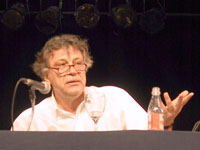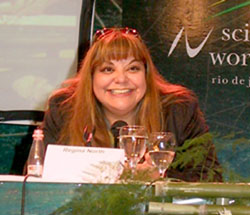|
Conferences
In order to foster greater quality and density in the event, the scientific programme included several conferences, to which were invited philosophers and experts who have contributed with their renowned expertise and reflections to the agenda of theoretical and practical issues that orient the actions of museums and science centres in different countries. All conferences were broadcasted alive – on the web – for twelve countries (Brazil, United States, Australia, France, India, Canada, Mexico, Colombia, South Africa, China, Belgium e Finland) and the videos are now available at www.museudavida.fiocruz.br/4scwc/videos.
José Luis Fiori
 |
| Rio TVA - Mauro Nascimento |
An economist and a doctor in political sciences, Fiori wrote several books in which he analyzed economical and social aspects of our society. He coordinates several projects in the area and is also a permanent colaborator of some brazilian newspapers.
Date: April 11th, 11h – 11h50
Title: Summary Of The Meeting: “Global Power and National Citizenships: Mainstreaming and Exclusion Dynamics”
In the last decade of the 20th Century, the hope or belief in a global economy and in the possibility of a cosmopolitan democracy was spread worldwide. Some people spoke of the “end of history” and a lot was written on the existence of a “new information economics” and of a “network society”, and one bet on the possibility that the production and dissemination of scientific knowledge would turn itself into a universal and collective education process for all national societies gathered in the same cosmopolis. It was a decade that became history as a fine utopian moment, but it was also a moment that lasted for a very short period of time. Just at the beginning of the 21st Century, the asymmetric nature of the economic globalization process was already visible, and the hope in a cosmopolitan and pacific democracy was giving way to the unilateral monopolization of power and the multiplication of wars. Little by little the inteliggentzia are going back to planting their feet on the ground and starting to diagnose the existence of mechanisms of struggle and of the monopolization of power and knowledge, as well as of barriers to the entry of new partners and citizens into the world of the rich, powerful and wise.
Well known for his engagement in science popularization actions, the Indian astrophysicist and cosmologist is the director of the respectful institution Inter-University Centre for Astronomy and Astrophysics, responsable for the continuing growth of astronomy and astrophysics nucleos at universities in India.
Date: April 12th, 11h – 11h50
Title: Science Centres as Tools for Science Education
This address will describe the structure of the family of science centres based on the Indian experience. Specifically it talks about the planetarium, the exploratory, the science museum and the science city. In what way these institutions can work towards making the layperson science-friendly? The Indian experience shows that despite the progress of science and technology, the mental attitudes of most Indians continue to be rooted in the past. The need for establishing the scientific temper had been stressed by no less a person than India’s leader to independence and its Prime Minister Jawaharlal Nehru who had hoped that once India became a free country its citizens will be able to think rationally. Ways and means are suggested here through which the family of science centres can help fulfill that dream.
|
Eduardo Viveiros de Castro |
Antropologist, researcher and professor of the Nacional Museum of the Federal University of Rio de Janeiro; indigenous culture specialist.
Date: April 12th, 19h – 19h50
Title: Nature in People: other Practices of Knowledge
A whole set of ideas and practices are exposed here, those present in the Amazon’s indigenous cultures related to what we would call “nature” by suggesting some of their possible philosophical implications. The core concept in such set is “perspectivism” referring to the way in which the different species of subjects (human and non-human) populating the cosmos perceive themselves and the other species forming their environment. The implications of such perspectivism for a virtual indigenous theory of Nature and Culture are outlined here as well as their contrast with the modern ontological vulgata.
 |
| Rio TVA - Mauro Nascimento |
Regina North works as a Senior Research Scientist for the Chief Scientist for Advanced Programs, Space Life Sciences Directorate, at NASA Johnson Space Center, and Universities Space Research Association. Previously, she worked at the Johnson Space Center in the Mission Operations Directorate, training astronaut crews to perform science and technology experiments in the International Space Station (ISS). Throughout her research career she has specialized in Human Behavior and Performance in Isolated and Confined Environments: Polar Stations (Estacao Comandante Ferraz), Submarines, Oil Offshore Platform, and Space Stations Mir and ISS.
Date: April 13th, 11h – 11h50
Title: Frontiers of Sciences of Life and Historical Evolution: Human Exploration of Mars and the Moon
As of the 2nd World War with the accelerated development of productive forces and expansion of economic frontiers, human beings have started to extend human conglomerates to new ecological niches. The Life Sciences’ role in such process becomes essential. And through the expansion of knowledge of elements required to sustain life and new materials and technologies, humans start settling in polar stations, oil platforms, submarines and further on in space stations. The next step of the great adventure is starting to take form with future exploration of Mars and the Moon. Once again the role of Life Sciences in space trips and planet surface operations remains first and paramount. This lecture will discuss the Life Sciences’ participation and its boundaries especially Molecular Biology within the scenario of exploration of Mars and the Moon.
A naturalist who has spent most of his career at the Transvaal Museum in Pretoria, South Africa, where he was director for 23 years. He has done extensive research on fossil assemblages from South African caves, where early hominids (some of which gave rise to humans) regularly fell prey to predators, and is currently pursuing his interest in the roots of predation among the earliest animal fossils in Namibia.
Date: April 13th, 19h – 19h50
Title: Where has Science come from? Exploring some of the ancient roots of intelligence and technology.
During the last two million years, the size of the brain in our human ancestors has doubled, from an average of about 700 to 1400ccs. This was indeed a remarkable process, particularly as a brain is built of “expensive tissue”, using a considerable amount of metabolic energy. The increase must have been driven by strong selective pressures and, in this lecture, I argue that a critically important pressure was imposed by predators that were common in the relatively open African habitats where these early humans lived.
|



